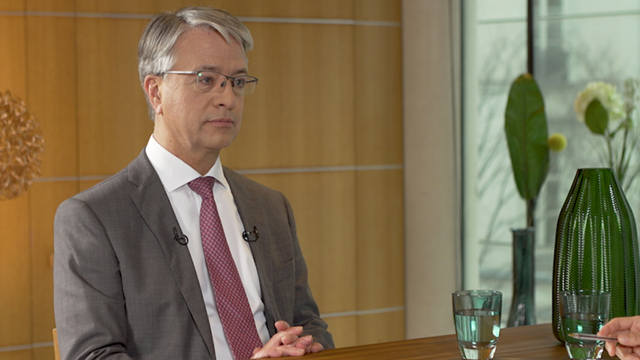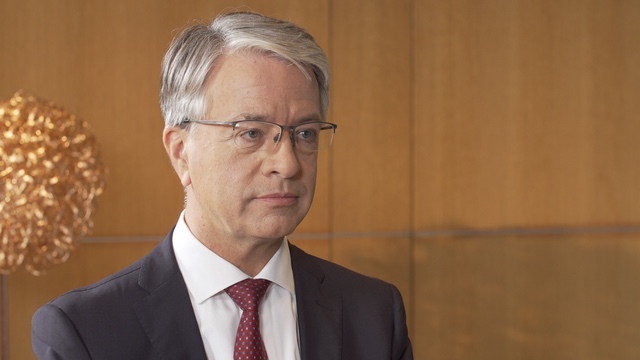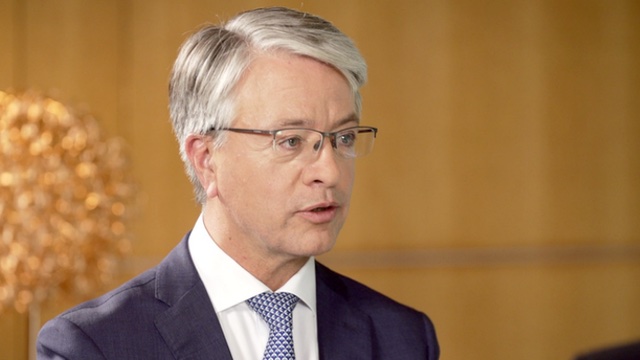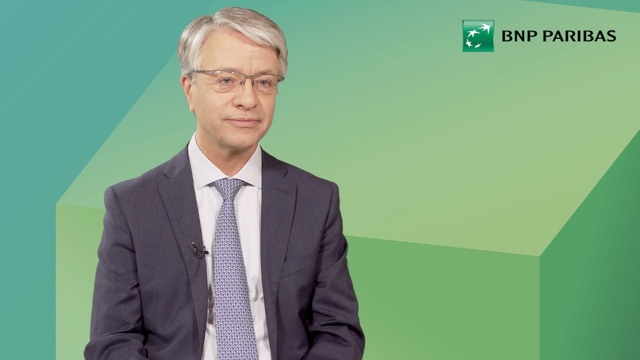EuroBusiness Media (EBM): BNP Paribas, one of the Euro-zone’s largest banks, just reported second-quarter profit. Baudouin Prot, welcome. You are the CEO of BNP Paribas. What are your comments on the company's overall performance in the second-quarter?
Baudouin Prot (BP): Well, first and foremost, BNP Paribas’ net income at 1.5 billion euros is another strong performance, especially given the absence of any one-off gains and the inclusion of a significant credit adjustment on monolines this quarter in CIB, for 457 million euros in revenues and 85 million euros in cost of risk. There are no other significant mark-downs this quarter.
One year into this crisis, I am really pleased to report that all our divisions have reported positive pre-tax income each quarter, including CIB which this quarter was not only profitable but also showed a meaningful rebound in pre-tax income, with more than 500 million euros compared to just over 300 million the first quarter of 2008.
On the revenue side, operational divisions are down a mere 4% compared to the record level of the second quarter of last year, and up 10,6% compared to the first-quarter of this year. This shows that our business model is holding up well during tough times.
Costs are well under control with an increase of less than 1% for operational divisions.
Given the deteriorating environment, the cost of risk is on the rise at 662 million euros, an increase of 100 million euros compared to the first quarter of 2008, and of 400 million euros compared to the very low pre-crisis level of the second-quarter of last year.
Overall, for the first half of 2008, BNP Paribas has generated 3.5 billion euros of net profit, or a half-yearly EPS of 3.8 euros, which are both a very good performance given the environment.
EBM: Today BNP Paribas is one of the only French banks that has not done a capital increase in the aftermath of the financial crisis. However, your tier one ratio is also now the lowest among your peers in France. Is increasing the tier one ratio inevitable?
BP: We really feel no pressure whatsoever to raise capital.
Let me remind you first that we are also the only French bank that has weathered the crisis well, while many other US or European banks suffered severe losses, forcing them both to raise capital and to increase their Tier 1 targets.
As for BNP Paribas, quarter after quarter, we have preserved and created capital through our own earnings generation.
At 7.6%, our Tier 1 ratio has been stable since the beginning of 2008, at a level higher than before the crisis, when we were running the bank at around 7.2-7.3%.
And in the meanwhile, we’ve also been able to grow our client business, with a risk-weighted asset growth targeted this year at around 10%, allowing us to gain both new clients and market share.
Our current level of Tier 1 is adequate given our risk profile, business diversification, and our strong and recurring earnings stream. These factors were all taken into account by Standard & Poor’s last month when it reaffirmed our AA+ rating, which makes us one of the 4 best-rated banks in the world.
This is also reflected by the market as BNP Paribas’ CDS spread is the lowest in our peer group.
EBM: In the current difficult environment, you nevertheless manage to post strong results in every part of your business, including CIB. What sets BNP Paribas apart from its peers?
BP: You are right to say that one year after the beginning of the crisis BNP Paribas is really standing out of the crowd. Despite the large scale of our CIB platform, despite our significant presence in the US retail banking, we have managed to limit our exposures to the most toxic areas because we have a risk management culture which encourages the questioning about the rationale of our development. If, after due assessment, we are not truly convinced by the long term risk/reward of a product or of a business, then we would rather not invest, even if we may miss some short term revenue opportunities.
So we’ve not only been able to limit our risks, but our revenue generation machine is continuing to nicely tick over and we’ve been able to continue to focus on our clients.
EBM: For the past decade, throughout the cycle, you have consistently delivered a 15% or so ROE. Is it fair for the market to assume that BNP Paribas can sustain such a return in the future?
BP: Indeed, I retain this threshold as a core ambition for the group. Our track record shows that our ROE has been well over 15% in the last few years, with a level of around 20% in 2006, and even in 2007 despite the crisis. Once again our ROE has remained over 15% in the first-half of this year at 15.8%.
EBM: Given that the financial crisis now seems to be spreading to the rest of the economy, is it fair to assume that bad debt charges will rise, especially on corporate and SME exposure, and also on consumer lending exposure, including in the US? What is the cost of risk level we should anticipate in years to come?
BP: We have always had a stringent risk policy, usually outperforming our peers in terms of cost of risk over the cycle, and we will strive to maintain this outperformance. Given the deteriorating environment, the cost of risk is indeed on the rise at 662 million euros this quarter, mainly on BancWest and in Personal Finance, notably in Spain. In CIB, we are moving from net write-backs to fairly limited write-downs.
Unlike many of our peers and our European neighbours, our 2 domestic markets in France and Italy have not suffered a house price bubble nor do they possess a subprime market.
Given the quality of our retail and corporate portfolios, and based on the current economic outlook, we don’t expect a major deterioration at Group level in the coming few quarters, and we certainly intend to maintain our strong track record in risk management.
EBM: For the first time in many years, the French mortgage market is expected to decline this year. Do you still confirm today your guidance of 4% growth in revenues for your French retail business?
BP: First of all, let me remind you that 4% revenue growth is a target for the medium-term.
In 2008, the 3% revenue growth this first-half already is a significant achievement, given the very high base in the first-half of last year, on one side, and the very unfavourable equity market, on the other side, which certainly impacts the level of financial fees.
In the French market, underlying volume trends remain solid. However, with the rise in regulated rates in August, there will be more pressure on deposits margin in the second-half of this year.
As relates to BNP Paribas, our commercial momentum remains strong, with high customer acquisition number, and continued cross-selling successes with Asset Management Services and Corporate and Investment Banking.
In this challenging environment, we control our costs more than ever, which will allow us to deliver again in 2008 a 1% jaws effect, as we’ve done every year for the past few years.
EBM: Regarding AMS -- Asset Management -- are you still confident in your ability to duplicate in Italy with BNL your successful strategy in France of cross-selling between retail and the AMS platform? If so, is there any reason to be worried about the decelerating trend in life insurance in France?
BP: First I want to stress the solid results of our AMS division this quarter. Despite the unfavourable environment, AMS achieved record revenues this quarter, driven by double-digit revenue growth in both Securities Services and Insurance.
Net inflows were slightly negative this quarter, in line with the current market environment, after a very strong performance in the first-quarter of this year. In France, life insurance gross asset inflows were down 8%, in line with the market, driven down by poor market environment, although medium term structural trends remain positive.
As regards Italy, this market is experiencing huge outflows, which impacts BNL as well. But our cross-selling strategy in Italy is working well. For example we have now a penetration rate of 2/3 of creditor insurance. We are also seeing the first benefits of the implementation in Italy of the private banking model of the Group. More broadly, we need to adapt our product and marketing offering in Italy to meet the Italian customer’s behaviour and that provide them with attractive returns over time. Over the medium term, we remain confident that our combination of product expertise and local knowledge will give us an edge in this matter.
EBM: What is your plan to better leverage BancWest, given the challenging environment in the US today?
BP: BancWest has resumed a solid revenue growth trend with revenues up 13.7% at constant exchange rate in the second-quarter. It benefits from a flight to quality, as the banking system in the US is suffering from the subprime crisis. BancWest’s attractiveness to clients has significantly improved, with for example an award as “Best bank for client service in the West”.
We grew the outstanding loans by 12% year on year. Our way to leverage BancWest is very simple: we will continue to do more business with more clients, while remaining extremely vigilant in managing our risks.
EBM: Emerging market growth is perceived as a hedge against the decline of mature markets such as the US or Europe. However, investors are increasingly worried that the crisis will spread to emerging market growth. Are you seeing any signs of this in your retail or CIB activities in emerging markets?
BP: First we have always been prudent about Emerging Markets, which account for about 10% of Group revenues. As we’ve entered these markets with small tickets, and then grown them organically, there is very little emerging market related goodwill on our balance sheet. Therefore, we feel that continued organic growth could be a good source of future profits, so long as we keep a tight control of risk.
In our emerging market branch banking business, we see only a moderate increase in cost of risk, and we continue to see strong revenue growth at + 27% this quarter.
In CIB, our emerging market business is mainly in Asia, the Gulf region, and Russia -- regions which enjoy really strong growth, and where our relative position is improving. Therefore, given the nature of our business, very focused on derivatives and on energy finance, we do not expect a significant deterioration in credit costs in the near future.
EBM: You surprised the market by acquiring Bank of America's prime brokerage unit, at a time when few banks are making acquisitions. Is this a taste of things to come, and should we not be surprised to see you make more acquisitions in your CIB branch later this year?
BP: I must say I really don’t think we surprised the market for two reasons: the first being that since Bank of America announced its decision to sell it, there were many leaks in the press that we were the last remaining candidate to buy it; and second, and most importantly, it is fully in line with our stated strategy for CIB of favouring organic growth while being open to small bolt-on acquisitions in our areas of expertise, provided they fit our strict acquisition criteria. We’ve always said we wouldn’t make a large scale acquisition in CIB, and that certainly hasn’t changed.
So the Prime Brokerage business of Bank of America was an excellent opportunity for us, and we’re now going to concentrate on integrating and leveraging it. Apart from that, CIB priority remains organic growth.
EBM: Some of your competitors, in Benelux or Switzerland for example, are experiencing difficulties. Would you be interested if some of these banks were to dispose of some of their assets? If so, which assets would interest you most: retail, private banking, or asset management? And also, do you intend to participate in the ongoing wave of domestic consolidation in banking in Germany?
BP: We are rumoured to be interested in everything that moves, or could move, and it is nice to know that the rumour mill remains active. Our acquisition strategy is well known in terms of what businesses and geographies we like, as well as our disciplined approach in terms of financial criteria and execution risk. Even if there are more opportunities, we will as always keep a cool head at BNP Paribas. Our first priority is to concentrate on organic growth and leverage the increasing attractiveness of our Group.
EBM: And lastly, can we expect to see BNP Paribas make any disposals of non-strategic assets, or even opening up the capital of BNP Paribas Assurances for example?
BP: As any industrial player, BNP Paribas regularly reviews the strategic fit and profitability of each business. However, as we do not face capital shortage, we feel no pressure to disinvest any division.
EBM: Baudouin Prot, CEO of BNP Paribas, thank you very much.
BP: Thank you.






